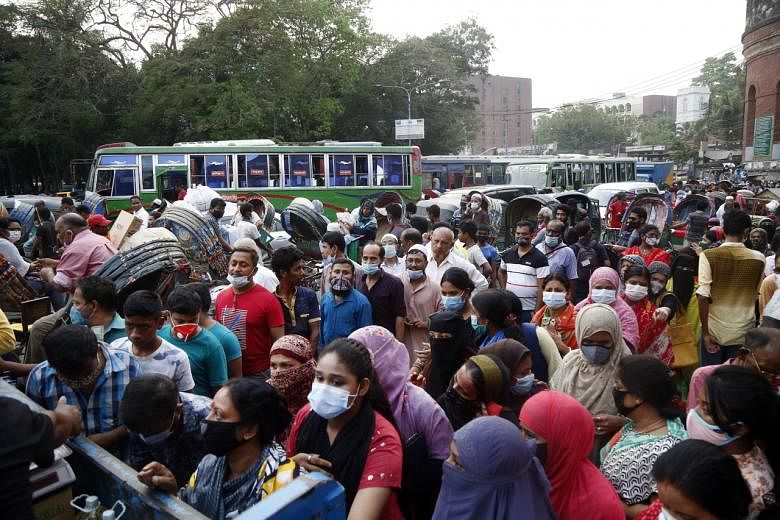DHAKA (THE DAILY STAR/ASIA NEWS NETWORK) - As economic pain from the coronavirus fall-out continues to bite the country, it's the poor and ultra-poor who stand to suffer the most.
This was as true during the first nationwide lockdown (or "general holiday") last year as it is on the eve of the second, discounting the recent farce of a lockdown imposed on April 5. What will happen to the poor and marginalised when the "all-out" lockdown goes into effect and they are forced to stay indoors and wait out the second wave-provided that's still the goal?
The one-week lockdown, starting tomorrow, will likely be extended, and the havoc it will wreak on the poor is not hard to predict. Unfortunately, we haven't yet seen any policy initiative or announcement in this regard. If our experience of the first lockdown is any indication, the consequence of delayed or inadequate action will be disastrous.
It's worth recalling the government's performance during the first lockdown. Last year, the government had allocated Tk 1,258 crore (S$198,900) under a stimulus package aimed to provide the poor with Tk 2,500 each. Although it initially planned to provide cash incentives to 50 lakh families under this package, only 35 lakh families reportedly received the incentives.
And the initiative had to be stopped midway following allegations of anomalies over the list of beneficiaries. Also, an OMS rice programme, undertaken to allow the poor in urban areas to buy rice at Tk 10 per kg, was abandoned because it was not viable without a list of beneficiaries.
The result of such failures and inefficiencies-according to a survey by the South Asian Network on Economic Modelling (Sanem) in November and December-is that 42 per cent of 5,577 households surveyed went below the poverty line. Three words can sum up the government's response: casual, uncoordinated and unaccountable.
We can't keep repeating the mistakes of our past. Experts, therefore, have urged the government to come up with a comprehensive action plan this time that pays equal attention to virus containment and softening of its economic blow.
For the poor under lockdown, and facing threats of income loss and starvation, it means having food on their table as well as enough cash support to meet other basic necessities. On Sunday, during a pre-budget virtual meeting with the finance minister, economists have made various suggestions including opening a lockdown-time hotline service through which ultra-poor people and marginalised groups facing food crisis can communicate their sufferings, so the authorities can take prompt steps to get food to them.
Other steps include sending them cash incentives digitally. Economists have also stressed that more allocations should be made for the health sector, especially in the tertiary- and mid-levels, in the upcoming budget, with the overarching aim to save lives and livelihoods.
This is not a big ask, nor is it unimplementable for a well-meaning and well-prepared administration. In light of the reality we face now, we expect to see a quick, efficient and judicious response from the government based on the lessons of its past mistakes and in consultation with public health experts and economists.
The government must ensure that the benefits of any financial or food aid programme it undertakes reach their intended beneficiaries, and are not robbed by corrupt officials and public representatives.
- The Daily Star is a member of The Straits Times media partner Asia News Network, an alliance of 23 news media organisations.

